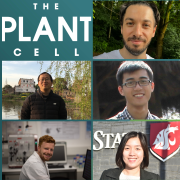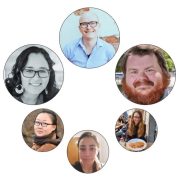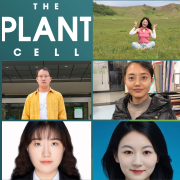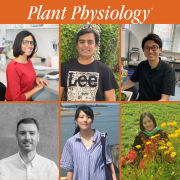How come approaching questions knowing little helped my career a lot?
Guest post by Ron Milo, Professor, Department of Plant and Environmental Sciences, Weizmann Institute of Science, Rehovot, Israel https://www.weizmann.ac.il/pla…
When I worked on analyzing biological networks I thought it was a disgrace I don’t know more about the relevant subject. Yet what we did propelled my career forward with two papers in Science. When my lab worked on metabolism and thermodynamics I was waiting for the science police to arrest us for not having the full training of the field. When we did a survey of the mass of all life on earth I was worried my lack of knowledge in ecology to be an insurmountable obstacle. After being wrong so many times, I now think there is a pattern here.
When you, or a student working with you, approaches a question, how much should they know about what has been done and tried in the field? Common sense would suggest “as much as possible”. Yet, from looking around and from personal experience following a path of starting with knowing “not very much” is often more productive. How can we reconcile this seeming paradox?
We form many of our concepts about what is the “right” way to do things in academic life during our undergraduate degree. There, learning as much as possible, reading more textbooks or listening to more lectures would almost “by definition” prepare you better for the test which serves as the gold standard and sets the patterns of best practices. This state of mind, or paradigm, positively reinforced over 3-4 years, does not go away when entering the world of postgraduate research just because tests are now less frequent.
But this paradigm of “more background knowledge is better” is something that can be detrimental to making creative leaps in research. Knowing how other people approached a question, especially when explained clearly in textbook or journal format, tends to make the reader also think of the problem in the same way. But in order to do an original contribution in science, you usually have to think about the problem or subject from a new perspective. Prior knowledge can sterilize imagination.
Too much knowledge at an early stage of a research project can also ruin your motivation and belief that you can find a new original path, that you can think of something that has not been thought of by anyone before.
Of course, on the other extreme, not knowing anything will limit you from understanding the question or the ingredients needed to tackle it. Therefore, I suggest that often there is a non-monotonic relationship between prior knowledge and the ability to make a conceptual breakthrough – leading to a “sweet spot” of knowing enough but not too much about a problem. This is where one wants to be at the start of a research project with breakthrough potential. But it doesn’t end here.
Once there will be a creative direction – and to explore it fully and in the end publish a paper that will share it with the world – one should at this point get deeply acquainted with the prior literature. This is a different phase of the research endeavor where you should revert to the paradigm of “more background knowledge is better”. So the sweet spot of partial knowledge is required only at a specific phase of the research, that of the conceptual creative jump.
There is a special challenge for the head of a research group, who has gone through the process culminating in a research paper many times, it will usually be the case that prior knowledge is already known and cannot be unlearnt. Therefore, the above is mostly relevant for the research student who is joining the research effort. For this new researcher, it is important to be in the sweet creative spot and it is often the role of the group leader to help the student be at that domain rather than pushing the student to the “know too much for thinking fresh” domain. This is often not easy for the group leader, as it is much less time-consuming to send a student to read something previously published than to meet and discuss with them while the student knowledge is still very partial. But this can often also be where the creative leaps happen and where the rewards will be highest.
In some cases, the situation can be reciprocal and the student is the “expert” who knows the field well and the mentor is less knowledgeable in terms of background material and can ask the naïve questions that will propel the research and give the required fresh perspective.
We should also be aware of delicate psychological aspects such as the sense of security associated with the knowledge that can be an obstacle to take risks. Encouraging adventurous paths with limited knowledge, the risk of being lost for a while should be nurtured because there are many reasons why some students might not like this.
There is also a breadth versus depth of knowledge distinction to be made. The quantity of knowledge is more problematic when it concerns depth versus breadth of knowledge at an early stage of a project. Having a broad knowledge base driven by curiosity allows potential connections between different problems/fields/concepts that contribute to a new perspective and creativity. Excessive depth of knowledge early on can be sterilizing because it might give the wrong impression that everything is known and understood about something when this is only from a given perspective.
Finally, it is good to remember that there is more than one path to creativity. There are many ways and they will be specific to the person and group working together and to the problem at hand. I therefore only aim to suggest that in some phases and for some people it is good to wait before getting to the stage of acquiring the knowledge produced by others.
 Ron Milo, Professor, Department of Plant and Environmental Sciences, Weizmann Institute of Science, Rehovot, Israel https://www.weizmann.ac.il/pla…
Ron Milo, Professor, Department of Plant and Environmental Sciences, Weizmann Institute of Science, Rehovot, Israel https://www.weizmann.ac.il/pla…
Acknowledgments: The thoughts presented here resulted from a stimulating discussion with Thomas Lecuit and Rob Phillips at the 2018 MBL physiology course.










Leave a Reply
Want to join the discussion?Feel free to contribute!